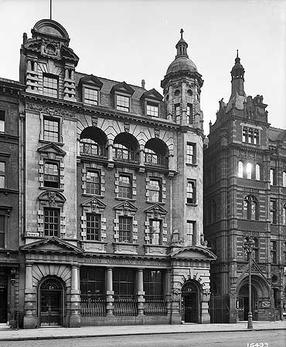
The National Bank of New Zealand Limited (NBNZ), often referred to as The National Bank, was one of New Zealand's largest banks. Throughout much of its history, the National Bank provided commercial banking services to mainly major industrial and rural as well as some personal customers.

ANZ Bank New Zealand Limited is a New Zealand banking and financial services company, which operates as a subsidiary of Australia and New Zealand Banking Group Limited of Australia. ANZ is one of New Zealand's big four banks, and is the largest bank in New Zealand with approximately 30% of market share as of March 2021.

Bank of New Zealand (BNZ) is one of New Zealand's big four banks. It has been operating since October 1861, and since 1992 has been owned by National Australia Bank (NAB), retaining local governance with a New Zealand board of directors. The bank operates a variety of financial services covering retail, business, and institutional banking.
HSBC Bank Canada, formerly the Hongkong Bank of Canada (HBC), was a British-Canadian chartered bank and the former Canadian subsidiary of British multinational banking and financial services company HSBC.

The Australia and New Zealand Banking Group Limited, commonly known as ANZ Bank, is a multinational banking and financial services company headquartered in Melbourne, Victoria, Australia. It is Australia's second-largest bank by assets and fourth-largest bank by market capitalisation.

AMP Limited is an Australian financial services company that operates in Australia and New Zealand. It offers superannuation and investment products, financial advice and banking services through AMP Banking, including home loans and savings accounts. AMP is headquartered in Sydney, Australia. The company previously operated a global investment management business through its subsidiary AMP Capital.
Banking in Australia is dominated by four major banks: Commonwealth Bank, Westpac, Australia & New Zealand Banking Group and National Australia Bank. There are several smaller banks with a presence throughout the country which includes Bendigo and Adelaide Bank, Suncorp Bank, and a large number of other financial institutions, such as credit unions, building societies and mutual banks, which provide limited banking-type services and are described as authorised deposit-taking institutions (ADIs). Many large foreign banks have a presence, but few have a retail banking presence. The central bank is the Reserve Bank of Australia (RBA). The Australian government’s Financial Claims Scheme guarantees deposits up to $250,000 per account-holder per ADI in the event of the ADI failing.
Commonwealth banknote-issuing institutions also British Empire Paper Currency Issuers comprises a list of public, private, state-owned banks and other government bodies and Currency Boards who issued legal tender: banknotes.
The Big Four is the colloquial name given to the four main banks in several countries where the banking industry is dominated by just four institutions and where the phrase has thus gained relevance. Some countries include more or fewer institutions in such rankings, leading to other names such as Big Three, Big Five, or Big Six.
The Bank of Papua New Guinea is the central bank of Papua New Guinea, which has a core mandate to ensure price stability and maintain macroeconomic growth. To achieve this, it discharges four main functions; 1. responsible for the formulation and implementation of monetary policy, 2. ensure financial system development and stability, 3. ensure the payment system remain efficient, and 4. provide a banking role to the Government. It also manages the country's foreign reserves, issue the country's currency, manages the gold and foreign exchange of Papua New Guinea.

The historic overseas bank was established in London in 1828 as Leslie & Grindlay, agents and bankers to the British Army and business community in India. Banking operations expanded to include the Indian subcontinent, the Middle East and elements of Africa and Southeast Asia. It was styled Grindlay, Christian & Matthews in 1839, Grindlay & Co from 1843, Grindlay & Co Ltd from 1924 and Grindlays Bank Ltd in 1947 until its merger with the National Bank of India.
BSP Financial Group Limited (BSP) is the largest bank in Papua New Guinea, with 121 branches throughout the country and in 7 countries. BSP currently services over 650,000 business banking customers throughout the Pacific. As at 31 December 2022, BSP had total assets valued at K33.9 billion. Bank South Pacific is listed on the PNG Exchange Markets (PNGX) and, as of 25 May 2021, the Australian Securities Exchange (ASX).
UDC Finance Limited is a finance company in New Zealand. UDC's main expertise is now in providing asset-backed finance for plant, vehicles and equipment, where they do not rely on land or buildings as security. It is a subsidiary of Shinsei Bank.
Databank Systems Limited was the name of a not-for-profit "off balance sheet" company set up by a consortium of competing banks in New Zealand, to operate on what is nowadays termed a "Shared services Agency" basis, to provide computing resources for the consortium members. The company was set up in 1967, and in 12 years grew to be the largest non-Government data processing organisation in the Southern Hemisphere, servicing more than 1,200 banking offices.

Westpac Banking Corporation, known simply as Westpac, is an Australian multinational banking and financial services company headquartered at Westpac Place in Sydney.
Lloyds Bank International is a wholly owned subsidiary of Lloyds Bank Corporate Markets in the United Kingdom, which is in turn part of Lloyds Banking Group, one of the largest banking groups in Europe.

ING Bank (Australia) Limited is a direct bank operating in Australia. It is a wholly owned subsidiary of the multinational Dutch bank, ING Group. ING in Australia holds an Australian banking licence as a foreign subsidiary company.
The history of the banking sector in New Zealand dates back to the early days of European settlement in the country. Over the years, the banking industry has played a vital role in supporting economic growth and development, providing financial services to individuals, businesses, and the government. This article explores the significant milestones and transformations in the history of the New Zealand banking sector.








